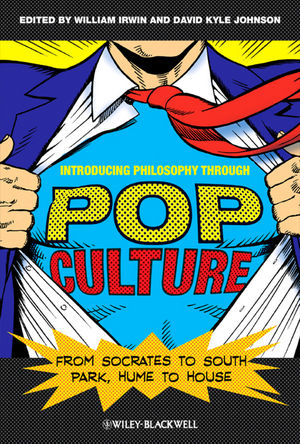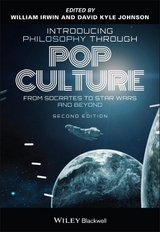
Introducing Philosophy Through Pop Culture
Wiley-Blackwell (an imprint of John Wiley & Sons Ltd) (Verlag)
978-1-4443-3453-1 (ISBN)
- Titel gebraucht verfügbar
- Artikel merken
What can South Park tell us about Socrates and the nature of evil? How does The Office help us to understand Sartre and existentialist ethics? Can Battlestar Galactica shed light on the existence of God? *Introducing Philosophy Through Pop Culture uses popular culture to illustrate important philosophical concepts and the work of the major philosophers * With examples from film, television, and music including South Park, The Matrix , X-Men, Batman, Harry Potter, Metallica and Lost, even the most abstract and complex philosophical ideas become easier to grasp * Features key essays from across the Blackwell Philosophy and Pop Culture series, as well as helpful editorial material and a glossary of philosophical terms * From metaphysics to epistemology; from ethics to the meaning of life, this unique introduction makes philosophy as engaging as popular culture itself * Supplementary website available with teaching guides, sample materials and links to further resources at www.pop-philosophy.org
William Irwin is professor of Philosophy and Director of the Honors Program at King's College in Pennsylvania. In addition to publishing in leading scholarly journals such as Philosophy and Literature and The Journal of Aesthetics and Art Criticism, Irwin originated the philosophy and popular culture genre of books with Seinfeld and Philosophy in 1999. Irwin has also co-edited The Simpsons and Philosophy and edited The Matrix and Philosophy and Metallica and Philosophy. He is currently the General Editor of the Blackwell Philosophy and Pop Culture series. David Kyle Johnson is assistant professor of Philosophy at King's College in Pennsylvania. In addition to his scholarly work on philosophy of religion, Johnson has edited Heroes and Philosophy and is also a contributor to the Blackwell Philosophy and Pop Culture series, having written chapters on South Park, Family Guy, The Office, Battlestar Galactica, and Batman. Johnson hosts a podcast on Pop Culture and Philosophy at www.philosophyandpopculture.com.
Introduction. How to Use this Book in a Philosophy Course. Part I. What is Philosophy? Section Introduction. Socrates and the Spirit of Philosophy 1. Flatulence and Philosophy: A Lot of Hot Air, or the Corruption of the Youth? (William W. Young III). Logic and Fallacies 2. The Chewbacca Defense: A South Park Logic Lesson (Robert Arp). Relativism and Truth 3. Wikiality, Truthiness, and Gut Thinking: Doing Philosophy Colbert-Style (David Kyle Johnson). Part II. Epistemology. Section Introduction. The Ethics of Belief 4. You Know, I learned Something Today: Stan Marsh and the Ethics of Belief (Henry Jacoby). Skepticism 5. Tumbling Down the Rabbit Hole: Knowledge, Reality, and the Pit of Skepticism (Matt Lawrence). The Definition of Knowledge, the Gettier Problem, and the Ethics of Belief 6. Adama's True Lie: Earth and the Problem of Knowledge (Eric J. Silverman). Part III. Metaphysics. Section Introduction. Philosophy of Mind 7. Mind and Body in Zion (Matt Lawrence). Personal Identity 8. The Many Lives of Wolverine: Memory and Personal Identity (Jason Southworth). Freedom and Determinism 9. Destiny in the Wizarding World (Jeremy Pierce). Artificial Intelligence, The Turing Test, and the Chinese Room 10. The Terminator Wins: Is the Extinction of the Human Race the End of People, or Just the Beginning? (Greg Littmann). Part IV. Philosophy of Religion. Section Introduction. The Problem of Evil 11. Cartmanland and the Problem of Evil (David Kyle Johnson). Faith Seeking Understanding 12. Aquinas and Rose on Faith and Reason (Daniel B. Gallagher). Arguments for the Existence of God 13. "I Am an Instrument of God": Religious Belief, Atheism, and Meaning (Jason T. Eberl and Jennifer A. Vines). Part V. Ethics. Section Introduction. Why Be Moral? 14. Plato on Gyges' Ring of Invisibility: The Power of Heroes and the Value of Virtue (Don Adams). Virtue Ethics 15. The Virtues of Humor: What The Office Can Teach Us About Aristotle's Ethics (Sean McAleer). Utilitarianism and Deontology 16. Why Doesn't Batman Kill the Joker? (Mark D. White). 17. Means, Ends, and the Critique of Pure Superheroes (J. Robert Loftis). Part VI. Challenges to Traditional Ethics. Section Introduction. Nietzschean and Marxist Critique 18. Metallica, Nietzsche, and Marx: The Immorality of Morality (Peter S. Fosl). 19. When Machines Get Souls: Nietzsche on the Cylon Uprising (Robert Sharp). Existentialist Ethics 20. Being-in-The Office: Sartre, the Look, and the Viewer (Matthew Meyer and Greg Schneider). 21. Batman's Confrontation with Death, Angst, and Freedom (David M. Hart). Feminist Critique 22. "You care for everybody": Cameron's Ethics of Care (Renee Kyle). 23. Vampire Love: The Second Sex Negotiates the 21st Century (Bonnie Mann). 24. Postmodern Critique Killing the Griffins: A Murderous Exposition of Postmodernism (J. Jeremy Wisnewski). Part VII. Social and Political Philosophy. Section Introduction. Social Contract Theory 25. Lost's State of Nature (Richard Davies). Marxism 26. Laughter between Distraction and Awakening: Marxist Themes in The Office (Michael Bray). Torture 27. The Ethics of Torture in 24: Shockingly Banal (Donal P. O'Mathuna). Race 28. Mutants and the Metaphysics of Race (Jeremy Pierce). Part VIII. Eastern Views. Section Introduction. 29. Zen and the Art of Cylon Maintenance (James McRae). 30. The Sound of One House Clapping: The Unmannerly Doctor as Zen Rhetorician (Jeffrey C. Ruff and Jeremy Barris). 31. The Tao of the Bat (Mark D. White). Part IX. The Meaning of Life. Section Introduction. 32. The Theistic View Beyond Godric's Hollow: Life after Death and the Search for Meaning (Jonathan L. Walls and Jerry L. Walls). 33. The Socratic View Selfish, Base Animals Crawling Across the Earth: House and the Meaning of Life (Henry Jacoby). Glossary. Notes on Contributors. Sources. Index.
| Erscheint lt. Verlag | 3.9.2010 |
|---|---|
| Verlagsort | Chicester |
| Sprache | englisch |
| Maße | 171 x 247 mm |
| Gewicht | 758 g |
| Themenwelt | Geisteswissenschaften ► Philosophie ► Allgemeines / Lexika |
| Sozialwissenschaften | |
| ISBN-10 | 1-4443-3453-0 / 1444334530 |
| ISBN-13 | 978-1-4443-3453-1 / 9781444334531 |
| Zustand | Neuware |
| Haben Sie eine Frage zum Produkt? |
aus dem Bereich




